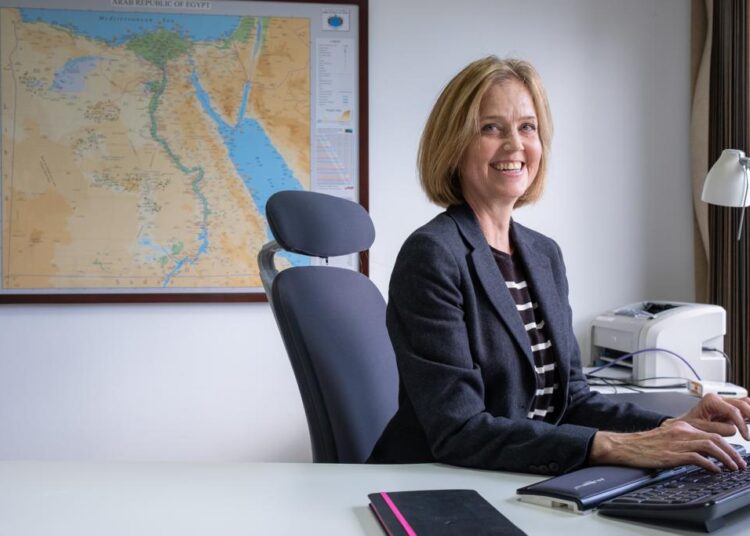Norwegian Ambassador Hilde Klemetsdal said the investment climate in Egypt has certainly improved in recent years as the government has put in place many important economic reforms that are conducive to foreign investments.
In her interview with the Egyptian Mail, she said the government seems to be ambitious and willing to tackle the many remaining challenges through further economic reforms in order to attract more investors and businesses to Egypt.
“As a result of the improved investment climate, we have seen a steady increase in the Norwegian Government Pension Fund Global’s investments in Egypt,” Klemetsdal said.
By the end of 2020, she added, the fund held shares in 33 companies in Egypt, worth a total of NOK4.8 billion ($ 550 million), compared to 2016, when the fund’s total holdings were less than NOK2 billion ($222 million).
Many Norwegian companies have invested in Egypt. Jotun, which produces paints and coating products, has been present in Egypt since the mid-1980s, and Skretting, a leading world supplier of feed and services for aquaculture, was established in Egypt in 2008 and has helped the Egyptian aquaculture industry grow into the largest in Africa.
Trade
In 2021, Norway exported NOK2.2 billion ($245 million) worth of goods to Egypt, while it imported goods from Egypt worth NOK300 million.
“Food products constituted more than one third of our imports. Norwegians eat a lot of fruit and vegetables, so it should be no surprise that oranges, grapes, strawberries and sweet potatoes topped the list. Quartz was another major import from Egypt last year,” Ambassador Klemetsdal said.
Like Egypt, she added, Norway is a large seafood producer. Egypt imports Norwegian fish and seafood, including the famous Norwegian salmon, herring, mackerel and trout.
The Norwegian ambassador pointed out that the trade between the two countries “is still relatively modest”.
“But I do believe there is plenty of potential for growth. I will do my best to promote new opportunities for trade and economic co-operation between our countries,” she said.
Co-operation
Ambassador Klemetsdal said that there is a great potential for increased co-operation in desalination, fish farming and renewable energy. “We share many common goals, including ensuring food security and reducing carbon emissions. Fish farming and renewable energy are an important part of the solutions, and these are areas where Norway has a lot of experience and can deliver state of the art technology,” she said.
The Norwegian renewable energy company Scatec is the largest foreign investor in the Benban solar park in Aswan, she added.
Scatec along with Orascom and the Sovereign Fund of Egypt, are planning for a large green hydrogen project in Ain Sokhna.
“They plan to deliver the 100MW green hydrogen facility, the first in Egypt and in the region, and present it during the COP27,” the ambassador said, referring to the 27th United Nations Climate Change conference which will be held in Sharm el-Sheikh this year.
Sterner is another Norwegian company with exciting plans in Egypt.
One of their upcoming projects, in cooperation with the Suez Canal Authority, is the development of an aquaculture operation with the capacity to produce 25,000 tonnes fish per year.
“Sterner will design, build and operate the world’s most sustainable seafood production facility in Ain Sokhna, with a hatchery, a processing plant and its own academy,” she said.
“They will apply leading recirculating aqua system (RAS) methodologies, and a solar park will deliver the full power requirements. The aim is to supply the high-end domestic market and export to Europe, Middle East and USA,” the ambassador added.
Regional issues
Ambassador Klemetsdal said that her country places great emphasis on the role of Egypt in the region.
“Egypt is a valued partner in the work of the international donor group for Palestine (Ad Hoc Liaison Committee – AHLC), which Norway chairs. We appreciate the long-term support Egypt for the Palestinian people, and their hard and patient work towards finding a way forward,” she said.
“We share the same goal of a two-state solution, which really is the only sustainable solution. The Egyptian government’s efforts in brokering a ceasefire and in rebuilding Gaza, is highly valued by Norway,” she added.
As a member of the Security Council, she said, we are very keen to have a close dialogue with Egypt on matters of peace and security, and in particular on regional issues and conflicts where Egypt plays a key role.
“We have a close dialogue with Egypt on Libya, and Norway appreciates the constructive role Egypt is playing in support of the implementation of the cease fire agreement and of the peaceful transfer of power to democratically elected institutions in Libya,” said Klemetsdal, who is also Ambassador to Libya.
Supporting women
Ambassador Klemetsdal said that the inclusion of women in the economy at all levels is critical to ensuring sustainable economic growth.
“Norway would have a GDP of only $400 billion if women’s participation in the labour market hadn’t grown over the last 40 years.
“We are therefore very supportive of female investors, and believe women should have the same possibilities as men to contribute to developing the private sector in Egypt. I have no doubt this will lead to a more robust Egyptian economy,” she said.
Norway’s Embassy funds several projects with different UN and other international organisations, as well as local NGOs.
“In all these projects, it is a requirement that women are included at all levels. For instance, the Embassy has a project with ILO about job creation. One of the components of this project is to support female self-employment by training them in micro-finance services and income-generating activities,” Klemetsdal said.






Discussion about this post